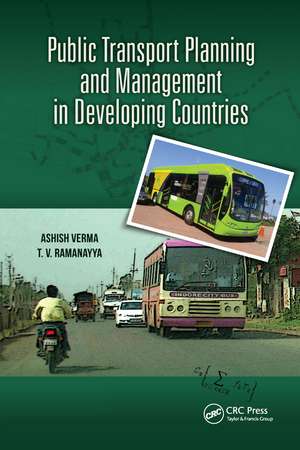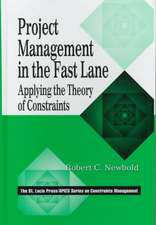Public Transport Planning and Management in Developing Countries
Autor Ashish Verma, T.V. Ramanayyaen Limba Engleză Paperback – 18 dec 2020
An efficient transportation system is critical for a country’s development. Yet cities in developing countries are typically characterized by high-density urban areas and poor public transport, as well as lack of proper roads, parking facilities, road user discipline, and control of land use, resulting in pollution, congestion, accidents, and a host of other transportation problems. Public Transport Planning and Management in Developing Countries examines the status of urban transport in India and other developing countries. It explains the principles of public transport planning and management that are relevant and suitable for developing countries, addresses current transportation system inefficiencies, explores the relationship between mobility and accessibility, and analyzes the results for future use.
Considers Socioeconomic and Demographic Characteristics
It’s projected that by 2030, developing nations will have more vehicles than developed nations, and automated guided transit (AGT) and other transport systems will soon be available in India. This text compares five cities using specific indicators—urbanization, population growth, vehicle ownership, and usage. It determines demographic and economic changes in India, and examines how these changes have impacted transportation demand and supply, transport policy and regulations, and aspects of economics and finance related to public transport. The authors emphasize preserving and improving existing modes, efficient use of the public transport management infrastructure, implementing proper planning measures, and encouraging a shift towards sustainable modes. They also discuss sustainability in terms of environment, energy, economic, and land use perspectives and consider the trends of motorization, vehicle growth, modal share, effects on mobility and environment, and transport energy consumption and emissions.
Public Transport Planning and Management in Developing Countries addresses the growing resource needs and economics of public transport in developing countries, explains various aspects of public transport planning and management, and provides readers with a basic understanding of both urban and rural public transport planning and management in developing countries.
| Toate formatele și edițiile | Preț | Express |
|---|---|---|
| Paperback (1) | 310.81 lei 6-8 săpt. | |
| CRC Press – 18 dec 2020 | 310.81 lei 6-8 săpt. | |
| Hardback (1) | 703.12 lei 6-8 săpt. | |
| CRC Press – 17 dec 2014 | 703.12 lei 6-8 săpt. |
Preț: 310.81 lei
Preț vechi: 378.44 lei
-18% Nou
Puncte Express: 466
Preț estimativ în valută:
59.47€ • 64.80$ • 50.12£
59.47€ • 64.80$ • 50.12£
Carte tipărită la comandă
Livrare economică 23 aprilie-07 mai
Preluare comenzi: 021 569.72.76
Specificații
ISBN-13: 9780367738662
ISBN-10: 036773866X
Pagini: 278
Dimensiuni: 156 x 234 mm
Greutate: 0.38 kg
Ediția:1
Editura: CRC Press
Colecția CRC Press
Locul publicării:Boca Raton, United States
ISBN-10: 036773866X
Pagini: 278
Dimensiuni: 156 x 234 mm
Greutate: 0.38 kg
Ediția:1
Editura: CRC Press
Colecția CRC Press
Locul publicării:Boca Raton, United States
Cuprins
Introduction. Demography and Settlement Patterns. Different Modes and Their Characteristics. Current Scenario of Public Transport (PT) in Developing Countries. Public Transport Planning in Rural Areas. Public Transport Planning In Urban Areas. Management of Public Transport. Resource Needs for Public Transport. Economics of Public Transport. References and Bibliography. Index.
Notă biografică
Dr. Ashish Verma holds a Ph.D. from IIT Bombay and is currently serving as an assistant professor of transportation engineering at the Department of Civil Engineer and the Center for Infrastructure, Sustainable Transportation, and Urban Planning (CiSTUP) at the Indian Institute of Science (IISc), Bangalore, India. He has authored more than 70 research publications in the areas of sustainable transportation and road safety. He is an editorial board member of leading international journals of the American Society of Civil Engineers (ASCE) and other publishers. More details about him can be seen on his home page at http://civil.iisc.ernet.in/ashishv/.
Professor T. V. Ramanayya holds a degree in civil engineering, a master's in transportation engineering, and a Ph.D. in transportation engineering, all from the Regional Engineering College (presently known as the National Institute of Technology) Warangal, Andhra Pradesh. He has four decades of experience (seven years in REC Warangal and 32 years at the Indian Institute of Management Bangalore) in teaching, training, research, and consultancy in the areas of transportation and urban infrastructure.
Professor T. V. Ramanayya holds a degree in civil engineering, a master's in transportation engineering, and a Ph.D. in transportation engineering, all from the Regional Engineering College (presently known as the National Institute of Technology) Warangal, Andhra Pradesh. He has four decades of experience (seven years in REC Warangal and 32 years at the Indian Institute of Management Bangalore) in teaching, training, research, and consultancy in the areas of transportation and urban infrastructure.
Recenzii
"I am not aware of a book written so well covering public transportation topics in developing countries… I want to have this book on my shelf."
—Srinivas S. Pulugurtha, The University of North Carolina at Charlotte, USA
"The main strength of this book is its relevancy to the context of developing countries. Behavior of traffic and its planning for developing countries is substantially different compared to those for developed countries. So, this book focuses on this aspect primarily and discusses the policy that needs to be taken for developing countries. Including the aspects of economics and finance related to public transport further makes this book complete."
—Pranamesh Chakraborty, Assistant Professor, KIIT University, Bhubaneswar
"The focus on public transport in emerging economies, with case studies from Indian cities such as Bangalore, is a particular strength of this book. This makes the book a good reference for understanding the current status of public transport planning and relevant issues in India. Several chapters in the book have benefited from a blend of the authors’ academic expertise and their practical experience in public transport planning."
—Abdul Rawoof Pinjari, University of South Florida
—Srinivas S. Pulugurtha, The University of North Carolina at Charlotte, USA
"The main strength of this book is its relevancy to the context of developing countries. Behavior of traffic and its planning for developing countries is substantially different compared to those for developed countries. So, this book focuses on this aspect primarily and discusses the policy that needs to be taken for developing countries. Including the aspects of economics and finance related to public transport further makes this book complete."
—Pranamesh Chakraborty, Assistant Professor, KIIT University, Bhubaneswar
"The focus on public transport in emerging economies, with case studies from Indian cities such as Bangalore, is a particular strength of this book. This makes the book a good reference for understanding the current status of public transport planning and relevant issues in India. Several chapters in the book have benefited from a blend of the authors’ academic expertise and their practical experience in public transport planning."
—Abdul Rawoof Pinjari, University of South Florida
Descriere
Many developing countries are attempting to expand and upgrade their public transport systems to create sustainable solutions within the constraints of poor land use and urban planning, haphazard growth of settlements, high population and population density, growing income, and increased travel demand. This text explains the principles of public
















